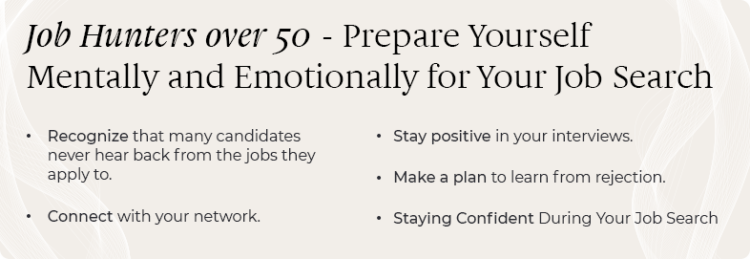Job Hunters over 50 – Prepare Yourself Mentally and Emotionally for Your Job Search was originally published on Ivy Exec.

These days, workers are staying in the labor force longer than ever before. Employees over 65 are the fastest-growing age demographic, a number that’s predicted to grow around 10 percent in the next 40 years.
What’s clear here is that workers in their 50s and beyond aren’t preparing to conclude their careers; rather, they’re gearing up to diversify their accomplishments in ways that would have been inconceivable a few generations ago.
Certainly, workers in their 50s and above will also be seeking new opportunities. Whether they’re looking for a position at their current company or applying elsewhere, these slightly older workers may have to contend with the ageism that’s prevalent in some workplaces.
Patti Temple Rocks notes some of the common myths about older workers, like their unwillingness to learn new skills, lack of creativity, burnout, and antipathy to technology.
“These stereotypes often paint older workers as technologically incompetent, stubborn and dead set against any kind of professional development. To be frank, these stereotypes are total nonsense. However, our society is so overrun with stereotypes about older people that it’s easy to — even unintentionally — fall into ageist thinking,” she writes.
So, it’s possible that older job seekers will be forced to confront some of these stereotypes in their job search.
Though age discrimination is illegal, more-seasoned employees may be more likely to face the job search blues. Specifically, after the pandemic, one-third of job seekers who counted themselves among the long-term unemployed were 55 and older; this stands in stark contrast to the only 21.8 percent of long-term unemployed workers from 16 to 54.
There are two realities at play here. Older workers can and do have satisfying careers that can last well into their sixties and beyond. At the same time, stereotypes and other cultural norms can make it harder for them to find the positions they want.
Of course, searching for a new job at any age can be demoralizing. Whether you are in a job you don’t like or are unemployed, sending out resume after resume, or completing interview after interview, can send anyone into a depressive spiral.
But job hunting doesn’t have to get you down. Here are our tips for older job seekers to stay positive while they search for a new position.

Recognize that many candidates never hear back from the jobs they apply to.
Regardless of their age or experience, most job candidates have to apply for many jobs before receiving an offer. Specifically, most people have to apply for anywhere between 21 to 80 jobs before landing one. What’s more, most corporate jobs receive 250 applications!
So, while some older job seekers may worry that their age or years on their resumes are holding them back, this very well may not be the case. Instead, one of our best ideas on how to survive your job search is being aware of these statistics. Job hunting almost always is a long and arduous process.
Connect with your network.
One of the demoralizing parts of job hunting is that you almost never receive feedback about why you weren’t hired. That means you might repeat the same crucial step that’s causing your resume to be overlooked – again and again.
At the same time, job hunting can be discouraging if you don’t have a network of folks keeping you motivated.
That’s why it’s important to reach out to your contacts. For instance, you can ask your colleagues to review your application materials to see if you’re missing important factors.
Also, connecting with someone – perhaps a contact who is looking for a new role – is one of the best tips for older job seekers on how to stay focused on their job search. The two of you can set weekly goals – like, for instance, attending one networking opportunity or applying to at least one job a week – and hold one another accountable.
Stay positive in your interviews.
Though ageism can be a problem, you won’t put your best foot forward if you’re sniffing around for hints of it in your interview. Rather, you should be excited about the interview and the job prospect, rather than trying to suss out discrimination (if it’s a problem, you’ll know!). If you go into the interview nervous or edgy, then you’ll never be able to talk about your accomplishments in the free-flowing, friendly way that will land you the job.
If you are concerned about combatting ageist stereotypes, you could prepare examples of technology initiatives you supported or describe your interest in collaborating with your future colleagues.
Make a plan to learn from rejection.
Whether you’re not hearing back after submitting applications, or you’re not landing jobs after interviews, you may feel demoralized, like you’re wasting your time. That’s why it’s so important to boost your emotional stamina by identifying something you have learned after each application.
For instance, after seeing the same skill listed on three job postings, perhaps you realized you needed to take a training course to develop this competency. Or, after an interview for a position you didn’t get, you might realize that you’re actually looking for a slightly-different role.
If you feel like you’re progressing in your job search, you’ll stay much more enthusiastic.
Staying Confident During Your Job Search
The best of the best of our tips for older job seekers? Be confident that you will find a position; your years of experience and selective eye for positions just may make it take a bit longer. Job hunts can be disheartening for anyone, but ageism – both real and imagined – can weigh heavily on job seekers 50 and over.
Understanding job hunt statistics, connecting with others, believing in yourself, and learning from rejection can help you withstand the emotional rollercoaster of job searching.
Wondering how to avoid age discrimination in the job search? Read this article.


